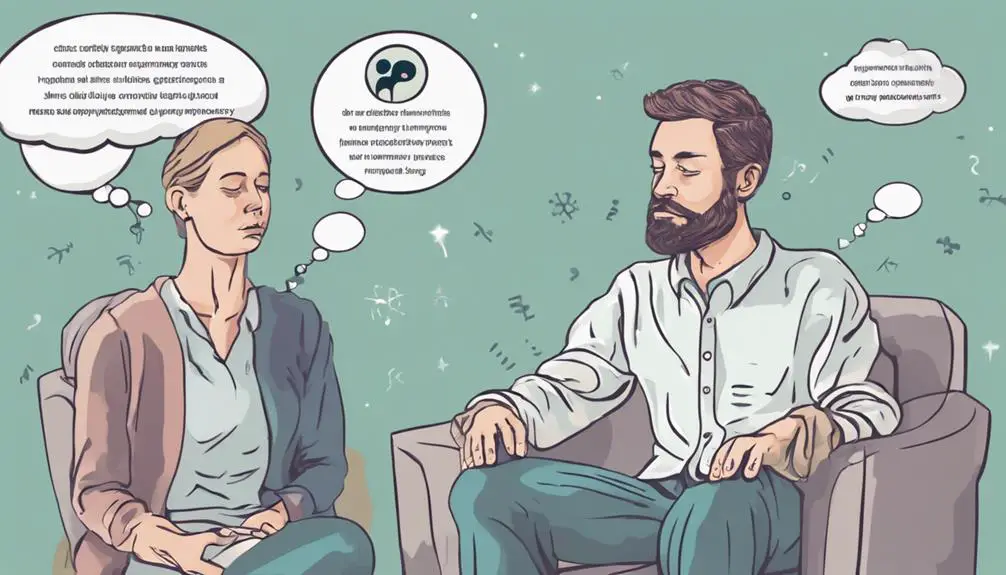Hypnosis Debunked
7 Best Ways to Clear Hypnosis Misconceptions
February 21, 2016 - Hypnosis Debunked
Understanding hypnosis involves clarifying misconceptions. Debunking stage hypnosis myths highlights its entertaining and voluntary nature. Recognizing the difference from meditation emphasizes its focus on entertainment, not self-awareness. Addressing control myths stresses that it's about suggestibility, not manipulation. Explaining willpower in hypnosis showcases collaboration and self-control. Dispelling memory misconceptions shows it doesn't create false memories. Unveiling the science behind hypnosis reveals brain changes and suggestibility influence. By learning more, one can gain a comprehensive understanding of hypnosis and its benefits.
Debunking Stage Hypnosis Misconceptions

In the realm of hypnosis, it is important to address and dispel common misconceptions surrounding stage hypnosis performances. One prevalent misconception is that stage hypnosis is a form of mind control or manipulation. However, it is crucial to understand that stage hypnosis is primarily about entertainment and audience participation.
The individuals who volunteer to go on stage are willing participants who are open to the experience, making it more about cooperation than control.
Stage hypnosis performances are designed to entertain audiences, often incorporating humor and theatrics to engage and captivate viewers. The entertainment value of these shows lies in the skill of the hypnotist to create a fun and engaging experience for both the participants and the spectators.
The focus is on creating a lighthearted atmosphere where the audience can enjoy the spectacle while witnessing the power of suggestion in action.
Clarifying the Difference With Meditation
Let's differentiate stage hypnosis from meditation to gain a clearer understanding of their distinct purposes and practices. While both involve altered states of consciousness, they serve different goals. Meditation focuses on mindfulness practice and embarking on a self-awareness journey. It aims to cultivate a deeper understanding of oneself, enhance presence in the moment, and develop inner peace.
On the other hand, stage hypnosis is often used for entertainment purposes, where individuals follow suggestions given by a hypnotist for amusement.
Meditation involves relaxation techniques and focus training to quiet the mind and enhance mental clarity. It encourages individuals to be fully present and engage with their thoughts and emotions in a non-judgmental manner. This practice can lead to improved emotional well-being, reduced stress levels, and enhanced self-awareness.
Understanding the differences between meditation and stage hypnosis can help dispel misconceptions surrounding hypnosis and highlight the benefits of incorporating mindfulness practices into daily life.
Addressing Control and Mind Manipulation Myths

There is a prevalent misconception surrounding hypnosis that it involves control and mind manipulation techniques, which is essential to address to foster a better understanding of this practice.
It is crucial to debunk these myths and address misconceptions to provide clarity on what hypnosis truly entails. Hypnosis is not about taking control of someone's mind or manipulating their thoughts against their will.
Instead, it is a state of focused attention and heightened suggestibility, where individuals are more open to positive suggestions that align with their goals and values.
Explaining the Role of Willpower in Hypnosis
Understanding the role of willpower in hypnosis is crucial to dispel misconceptions and clarify how individuals engage with this practice.
Willpower and suggestion play a significant role in hypnosis, but it is important to note that hypnosis is not mind control. Contrary to popular belief, individuals under hypnosis are not compelled to do things against their will. Instead, hypnosis works by enhancing focus and suggestibility, allowing individuals to access their subconscious mind more readily.
Self-control is still present during hypnosis, and individuals can choose to reject any suggestion that goes against their beliefs or values. Willpower remains intact, and the individual ultimately decides what actions to take based on the suggestions received. This aspect of hypnosis highlights the collaborative nature of the practice, where the hypnotized individual actively participates in the process.
Dispelling Myths About Memory and Hypnosis

Dispelling common myths about memory and hypnosis is essential to provide a clearer understanding of how these two elements interact within the practice.
In the realm of hypnosis, memory formation can be influenced by suggestions given during a hypnotic state. Contrary to popular belief, hypnosis does not create false memories, but it can potentially enhance the susceptibility to suggestions, leading individuals to recall events differently.
It is crucial to acknowledge that memories are not fabricated under hypnosis; rather, the process can alter the perception of past experiences. Hypnotic susceptibility varies among individuals, with some being more receptive to suggestions than others. This susceptibility does not imply a loss of control or awareness but rather a heightened focus on the hypnotist's guidance.
Understanding the Science Behind Hypnosis
Exploring the underlying mechanisms of hypnosis sheds light on the intricate science behind this altered state of consciousness. When a person is hypnotized, their brain activity undergoes changes that lead to altered states characterized by heightened suggestibility and intense focus.
Research using neuroimaging techniques has shown that during hypnosis, specific brain regions associated with attention, control, and suggestibility become more active, while others decrease in activity. This suggests that hypnosis is not a mystical or magical phenomenon but rather a scientifically measurable state of mind.
Suggestibility plays a crucial role in how effective hypnosis can be for an individual. People who are highly suggestible may experience deeper hypnotic states and be more responsive to hypnotic suggestions. Additionally, the ability to focus attention intensely on the hypnotist's instructions is essential for the induction and maintenance of hypnosis.
Understanding the scientific basis of hypnosis can help demystify this practice and highlight its potential as a therapeutic tool for various conditions.
Breaking the Stigma Around Hypnotherapy

Addressing misconceptions and misinformation is crucial in shifting societal perceptions of hypnotherapy towards a more accepting and informed perspective. Public perception of hypnotherapy is often clouded by misconceptions fueled by media portrayals and entertainment.
The stigma surrounding hypnotherapy as a mysterious or even manipulative practice can deter individuals from seeking its potential benefits for various mental and physical health issues.
Education plays a vital role in dispelling myths and fostering a better understanding of hypnotherapy. By providing accurate information about the science behind hypnosis and the therapeutic applications of hypnotherapy, individuals can make more informed decisions about incorporating it into their wellness routines.
Professional organizations, mental health professionals, and hypnotherapists themselves have a responsibility to engage in educational outreach to increase awareness and promote an evidence-based view of hypnotherapy.
Breaking the stigma around hypnotherapy requires a collective effort to challenge misconceptions, provide education, and highlight the positive impact it can have on individuals' well-being.
Frequently Asked Questions
Can Hypnosis Make Me Do Things Against My Will?
Hypnosis cannot make you do things against your will. Ethical boundaries are crucial in hypnotherapy, ensuring informed consent and personal empowerment. Hypnosis aims to facilitate self-control and positive change, respecting individuals' autonomy and well-being.
Is Hypnosis the Same as Being in a Trance?
When considering hypnosis, it's essential to understand that being in a trance state is a common experience during hypnosis. This trance experience is a key aspect of hypnosis effectiveness, facilitating focused attention and suggestibility for therapeutic purposes.
Can Anyone Be Hypnotized?
Hypnosis effectiveness varies among individuals, but most can benefit from hypnosis therapy. Factors such as willingness, suggestibility, and rapport with the therapist play a role in determining who can be hypnotized.
Does Hypnosis Work on Changing Fundamental Beliefs?
Hypnosis can be effective in changing fundamental beliefs through belief transformation and subconscious influence. By utilizing hypnotic suggestion and cognitive restructuring techniques, individuals can explore deep-seated beliefs and work towards reshaping them in a positive manner.
Is Hypnosis a Form of Mind Control?
Hypnosis is not mind control. It operates within ethical boundaries, respecting free will and requiring consent. Instead of coercion, it focuses on empowerment, utilizing the individual's subconscious to facilitate positive change with their full cooperation.
Conclusion
In conclusion, it is important to address and clear up misconceptions surrounding hypnosis in order to better understand its benefits and uses.
By debunking myths and providing accurate information, individuals can make informed decisions about incorporating hypnosis into their lives.
Through education and understanding, we can break down the stigma surrounding hypnotherapy and promote its effectiveness as a tool for personal growth and positive change.
